HomeReviewsThe Thaumaturge
The Thaumaturge review: a knotty detective RPG brewed in a rich, historical melting potMonsters in my pocket
Monsters in my pocket
Image credit:Rock Paper Shotgun/11 Bit Studios
Image credit:Rock Paper Shotgun/11 Bit Studios
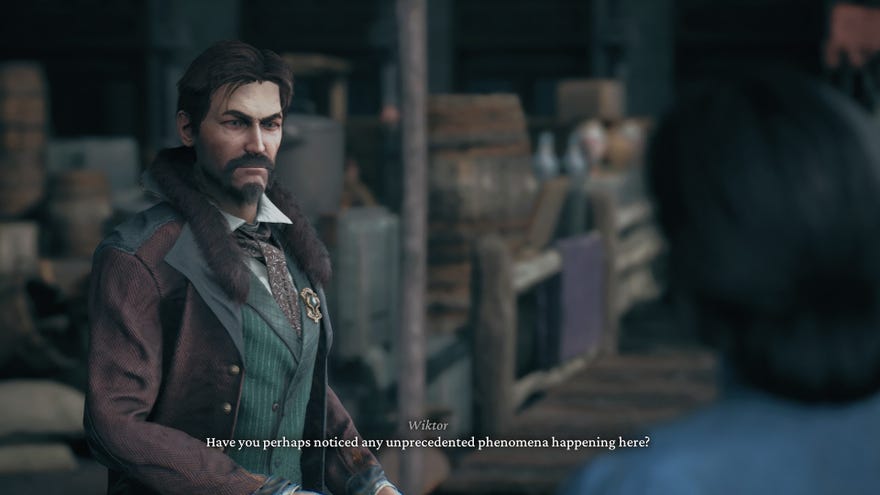
Viewed from a top-down perspective, The Thaumaturge presents a detailed vision of early twentieth century Warsaw. |Image credit:Rock Paper Shotgun/11 Bit Studios
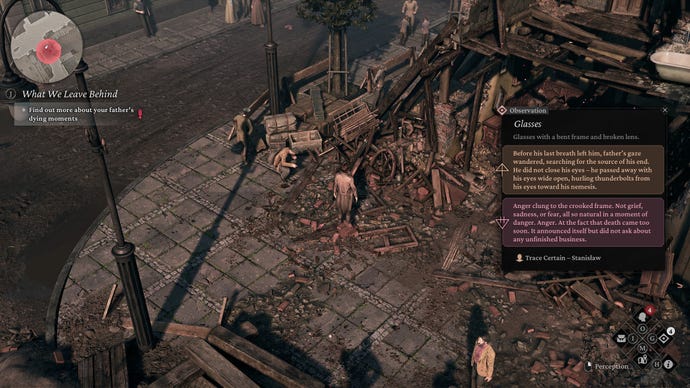
When gathering evidence, Wiktor can use his thaumaturgy senses to reveal hidden details in the environment, sensing hidden emotions imbued in leftover objects that can evocatively captured in brief snippets of text. |Image credit:Rock Paper Shotgun/11 Bit Studios
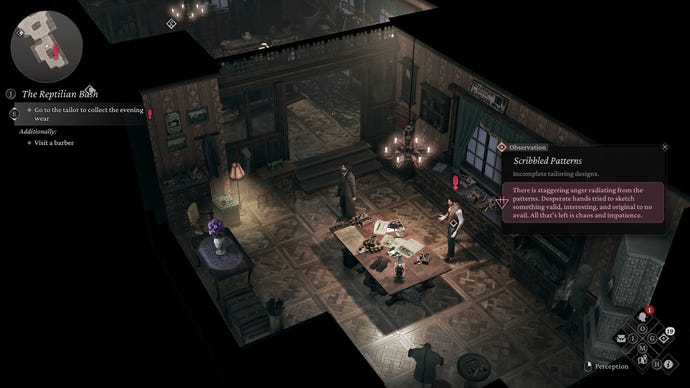
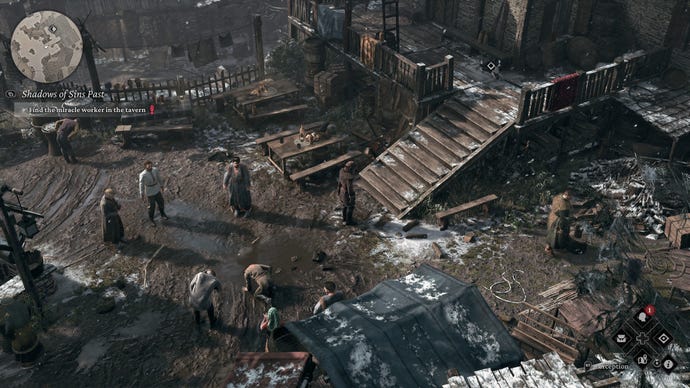
For all its supernatural themes, the events of The Thaumaturge are very much rooted in real-world history. Set in 1905, this is the year that the First Russian Revolution was just starting to kick into gear, and many of the sidequests and incidental details you’ll come across on Wiktor’s journey all lean on the political and social unrest of the time. Workers strikes, peasant uprisings, and religious and nationalist discrimination are all woven into the detailed, narrative fabric of The Thaumaturge, as are real historical figures such as Tsar Nikolai II and the mystic Grigori Rasputin. The latter becomes particularly entwined with Wiktor over the course of the game, as Rasputin isn’t just responsible for enabling Wiktor to handle and tame more and more Salutors, but his rise to power and cult figure-like status is also intimately tied to the game’s central plot.
Now, as someone whose knowledge of eastern European history ranges from spotty to non-existent, this alone is enough to make The Thaumaturge quite a fascinating and intriguing proposition. To my eyes and ears, at least, Fool’s Theory present a rich tapestry of viewpoints and perspectives here, with lower class folks regularly calling out Wiktor’s posh boy status, and challenging him on his right to stick his nose in all sorts of business that has nothing to do with him. Wiktor must also navigate the pressures of trying to return to high society as well, his travels and thaumaturge background having long since alienated him from his peers, and this feeling of never quite fitting in anywhere provides a fantastic stage on which players to role-play Wiktor as they see fit.
Dialogue options are both plentiful and nuanced enough for Wiktor to feel like a distinct product of the player’s choices in The Thaumaturge, his responses rarely falling into that familiar trap of being ‘obviously good’ or ‘very clearly bad’. There are polite ways to play him, sure, but there’s enough moral greyness here that you’ll almost always be disappointingsomeonearound you at the time, with Telltale-style ‘So and so will remember this’ prompts making you take extra care in how you come across.
Encountering a wild Salutor and tempting them out into the open requires a lot of work, but the horror-fuelled climax of your investigation is well worth the effort. |Image credit:Rock Paper Shotgun/11 Bit Studios
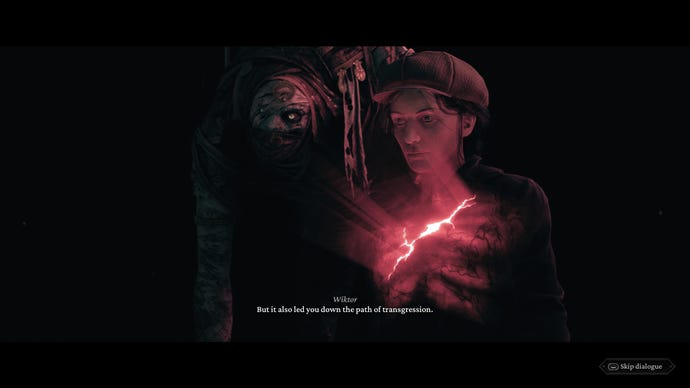
That said, it’s not just the Flaw of pride that Wiktor embodies. As you return to your childhood home in Warsaw to investigate your estranged father’s mysterious death, your investigations inevitably bring you into contact with other Flaw holders, and thus other Salutor hosts. Part of your job as a Thaumaturge will be to cleanse these individuals of their worst habits, sometimes to get important information out of them and make them realise the error of their ways, but mostly so you can possess and tame their respective Salutor. However, to keep that Salutor means Wiktor must also bear the burden of their respective Flaw, and it’s these other vices that never really get a look in after Wiktor’s dealt with the problem at hand. The idea of a man taking on the brunt of the world’s evils is a powerful one that’s packed with role-playing potential, so it’s a shame that Wiktor’s personality doesn’t end up morphing more as the game progresses.
Your actions have a profound effect on the types of dialogue choices you’re able to pick from. |Image credit:Rock Paper Shotgun/11 Bit Studios
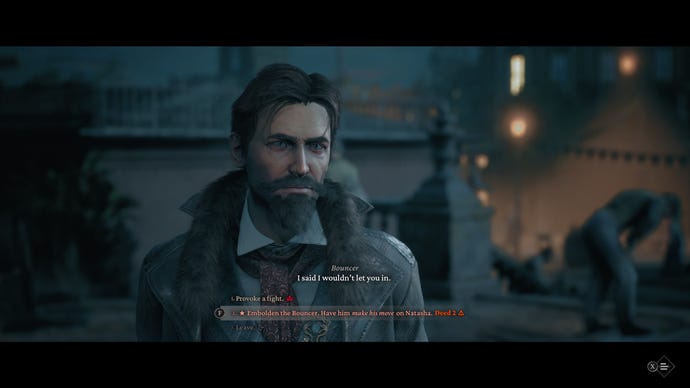

Fights are intensely strategic and puzzle-focused, and you’ll need to consider each move - and the time it takes to execute - before you act. |Image credit:Rock Paper Shotgun/11 Bit Studios
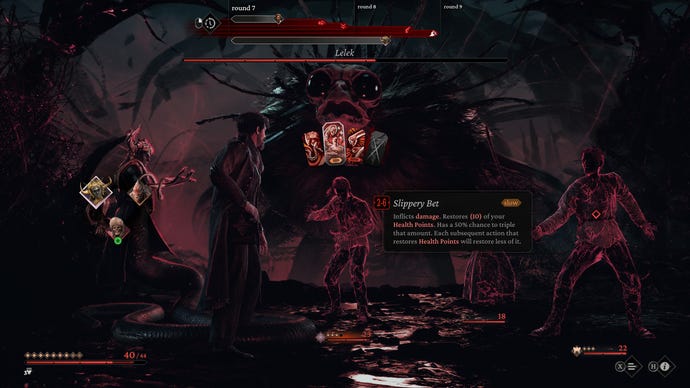
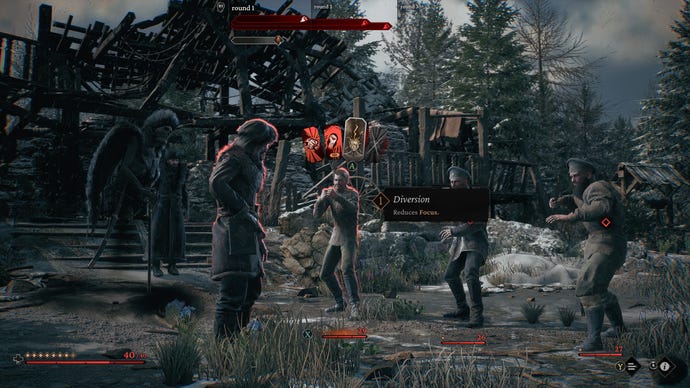
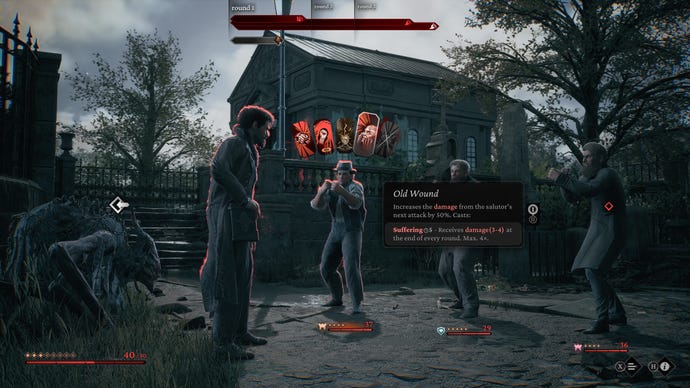
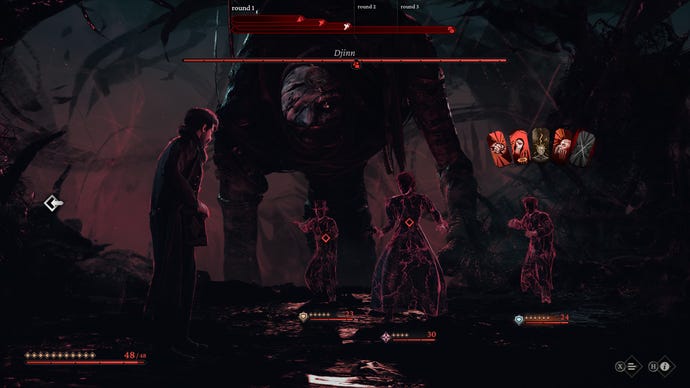
Accumulating these Salutors doesn’t just give you more options in battle, either. As you explore the city, pick up clues, engage in fights and complete all manner of different side activities, you’ll also gain experience that culminates in spendable Thaumaturgy points. These can be spent on upgrading your Salutors' abilities, which in turn strengthens the particular ‘Dimension’ of thaumaturgy they belong to. There are four Dimensions in total (with two Salutors attached to each), and certain dialogue options will require you to have a Word level of 5, say, or a Mind level of 7, in order to make that particular choice. This can be vital in nailing the outcome of a particular case, as Wiktor can use these powers to manipulate people into giving up their secrets. The pace of the game is such that I always had enough points to do what I needed - it’s certainly not stingy in that regard - though I was somewhat disappointed that there wasn’t another option in a lot of these cases to obtain the answers I needed without resorting to such underhand tactics. Sure, playing with emotions is all part and parcel of being a thaumaturge, but outright mind control does feel like you’re cheating a bit somehow.
Still, even with these small nitpicks, the important thing is that you can really see where and how your choices have affected the story, and crucially it does so in a way that feels organic and completely natural. It’s never so obvious to point outwhatthese characters remember about their encounters with you, and it leaves enough open to interpretation that you’ll be wanting to start another playthrough almost as soon as you’ve finished the first to see how differently the game might have turned out. Some Salutors can be stolen or given away to other rival thaumaturges you encounter, for example, and the consequences of those decisions do have tangible effects on how the rest of the story plays out - both in terms of what you’re able to do in the game, and how they interact with you later on.
It’s artfully done, and it all helps to make The Thaumaturge feel like a satisfying and reactive, malleable concoction of your own making. Sure, there are places where you’ll want more from its role-playing (and perhaps a touch more polish from its occasionally stilted animation and abrupt-feeling cutscenes). There are moments where you’ll ache thinking about its squandered potential, that if only it had gone just one step further, then it would be a true all-timer of an RPG.
But that’s also precisely why The Thaumaturge ends up feeling like such an interesting, rough-hewn gem of a game. It’s those wonky edges and the almost-but-not-quite-there presentation of them that gives it such a unique sense of character and personality, as well as the space and depth to debate its themes and ideas long after the credits have rolled. There’s a lot to applaud and admire here, particularly in how each one of its systems feeds and complements the others, and it makes its own crop of flaws easy enough to forgive and overlook when considered as a whole. Pride may not be the most favourable trait in the world of The Thaumaturge, but given what Fool’s Theory have managed to accomplish here, I’d say they’ve got plenty to be proud about.